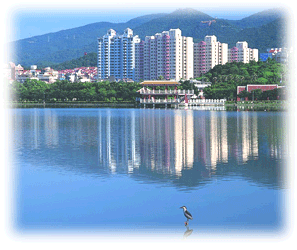Housing
For foreign investors, the government is actively planning an international village community. Currently, Taipei has three types of international villages: business residential, high-end residential, and foreigner enclaves. Business residential communities provide 24-hour hotel-style management services, including home care, recreation and leisure activities, and business meetings. Prices are two to four times those of an average rental. High-end residential rentals primarily serve science park management-level personnel , and are usually single-family or duplex style dwellings. Prices here are usually 100 to 200% higher than neighboring areas. Tianmu's educational, shopping and community environment is excellent, and there are nearby MRT stops with convenient transportation links. As a result, many foreigners have congregated there, and rentals are slightly higher than average apartment rentals. Some 2.6 million people live in the city of Taipei. This figure includes over 70,000 foreign nationals. These foreign residents come from over 100 countries and speak more than 70 languages. The varied cultures of these friends permeate the lifestyle of the city. Whether in culture, language or habits, Taipei displays a varied and colorful humanism. In a report prepared by the Economist Intelligence Unit (EIU), based largely on exchange rates and the prices of goods, in a comparison of 140 cities, worldwide, on measures of food, clothing and housing prices, Japan came up the most expensive place in Asia, with Singapore in second place. Taipei's cost of living, however, is ranked well below those of many Asian cities.Foreign residents
Living Quality
 According to a 2012 Mercer Human Resource Consulting “Quality of Living” survey, Taipei is the 85th most livable city in the world. Moreover, Taipei ranks ahead of Asian cities such as Shanghai. Based on the items surveyed, Taipei enjoys clear advantages in political and social environment, economic environment, socio-cultural environment, ethical and health considerations, public services and transport, consumer goods. In addition, Taipei was also cited in the “Taipei is quite a safe city and violent crimes are uncommon,” where the city “provides good connections to other Asian cities, plus a fairly good selection of flights to Western Europe and North America.”
According to a 2012 Mercer Human Resource Consulting “Quality of Living” survey, Taipei is the 85th most livable city in the world. Moreover, Taipei ranks ahead of Asian cities such as Shanghai. Based on the items surveyed, Taipei enjoys clear advantages in political and social environment, economic environment, socio-cultural environment, ethical and health considerations, public services and transport, consumer goods. In addition, Taipei was also cited in the “Taipei is quite a safe city and violent crimes are uncommon,” where the city “provides good connections to other Asian cities, plus a fairly good selection of flights to Western Europe and North America.”Living Cost

![Taiwan.gov.tw [ open a new window]](/images/egov.png)
